-
-
- Council Members
- Role of Council Members
- Council meetings
- Council elections
- Previous election results
- Dr Louise Allum
- Dr Sam Bescoby
- Dr Andrew Clemence
- Dr Tshidi Gardiner
- Dr Reginald Godwin
- Paddy Gordon
- Dr Danielle Greenberg
- Dr Gerard Henry
- Dr Richard Hillman
- Dr Benjamin Kennedy
- Dr Tom Lonsdale
- Dr Darren Partridge
- Martin Peaty
- Alison Price
- Dr Peter Robinson
- Dr Jennifer Simmons
- Dr Sadie Spencer
- Dr Mary Thomas
- William Wilkinson
- Dr Lara Wilson
- Past-Presidents
-
-
-
-
-
- About extra-mural studies (EMS)
- EMS requirements
- Information for vet students
- Information for EMS providers
- Information for vet schools
- Temporary EMS requirements
- Practice by students - regulations
- Health and safety on EMS placements
- EMS contacts and further guidance
- Extra-mural studies fit for the future
-
-
- Code of Professional Conduct for Veterinary Surgeons
- Code of Professional Conduct for Veterinary Nurses
- Contact the Advice Team
- XL Bully dog ban
- 'Under care' - guidance
- Advice on Schedule 3
- Controlled Drugs Guidance – A to Z
- Dealing with Difficult Situations webinar recordings
- FAQs – Common medicines pitfalls
- FAQs – Routine veterinary practice and clinical veterinary research
- FAQs – Advertising of practice names
- GDPR – RCVS information and Q&As
The global profession, career diversity and innovation in focus at RCVS Day 2017
11 July 2017
In his maiden speech as our new President for 2017-2018, Professor Stephen May signalled his intent to help foster a nurturing learning culture within the veterinary profession that allows vets and veterinary nurses to learn from their mistakes and pursue a range of careers and goals.
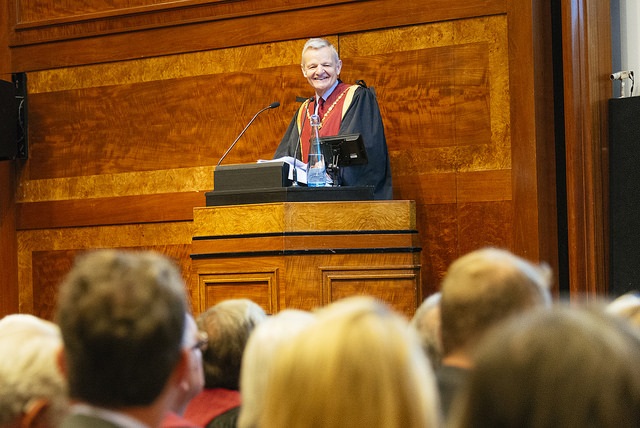 Professor May (pictured) was invested as President at RCVS Day 2017 – the College’s Annual General Meeting and awards ceremony – which took place at the Royal Institute of British Architects on Friday 7 July 2017. Stephen has been an elected member of RCVS Council since 2012, having previously been an appointed member of Council representing the Royal Veterinary College between 2001 and 2009. In 2016 he was re-elected to Council to serve a further four-year term and currently chairs the Legislation Working Party.
Professor May (pictured) was invested as President at RCVS Day 2017 – the College’s Annual General Meeting and awards ceremony – which took place at the Royal Institute of British Architects on Friday 7 July 2017. Stephen has been an elected member of RCVS Council since 2012, having previously been an appointed member of Council representing the Royal Veterinary College between 2001 and 2009. In 2016 he was re-elected to Council to serve a further four-year term and currently chairs the Legislation Working Party.
Stephen graduated from Cambridge in 1980 and subsequently spent time as a large animal practitioner. After undertaking further training in equine surgery and diagnostic imaging at the University of Liverpool, he studied for a PhD at the Royal Veterinary College (RVC) before returning to Liverpool as a Lecturer in Equine Orthopaedics. He went back to the RVC in 1993 to concentrate on equine clinical services and, in 1997, became Head of the Farm Animal and Equine Clinical Department. He was appointed the RVC’s Vice-Principal for Teaching from 2000 to 2013, Deputy Principal from 2013 to 2017 and currently holds the post of Senior Vice-Principal.
Addressing the need for a learning culture in his speech Stephen said: “Veterinary graduates have never had greater knowledge and technical skills than those graduating this year. But this can make their job so much harder when the certainty of scientific knowledge is confronted with the uncertainties of the sick animal, and the increasing number of possibilities for treatment have to be weighted alongside ethical and economic considerations.
“Of his age, but also prophetic of our age, the philosopher Bertrand Russell commented that ‘habits of thought cannot change as quickly as techniques with the result that as skill increases, wisdom fails’. So it is important that our young professionals are well-prepared in terms of professional, non-technical skills to cope with the sheer variety of challenges that they encounter, and we, as a profession, within our professional model, provide a nurturing learning culture rather than the blame and cover-up culture that the current emphasis on external regulation fosters, so pervasively and distressingly."
Stephen added that his other priorities would be working with the British Veterinary Association and other stakeholders to uphold the College’s first Brexit principle that ‘vital veterinary work continues to get done’, a project on graduate outcomes, which flows from the Vet Futures project, and the Legislation Working Party.
AGM and changes to RCVS and VN Councils
RCVS Day 2017 started with the Annual General Meeting of the membership of the College in which new members of RCVS and VN Councils were welcomed and appointments to the Officer team confirmed.
After an introduction to the proceedings by then President Chris Tufnell, members approved the minutes of last year’s AGM and the Annual Report and Statement of Accounts for 2016.
Our Registrar Eleanor Ferguson then read the results of the 2017 RCVS Council elections and the five new members of Council – Caroline Allen, Sarah Brown, Danny Chambers, Martin Peaty and Cheryl Scudamore – were invited to take up their seats and their four-year terms on Council. President Chris Tufnell, who had stood for re-election, was confirmed for a further four-year term.
In addition to the newly elected members, the Registrar confirmed that Privy Council-appointee Richard Davis would serve on RCVS Council for a further year.
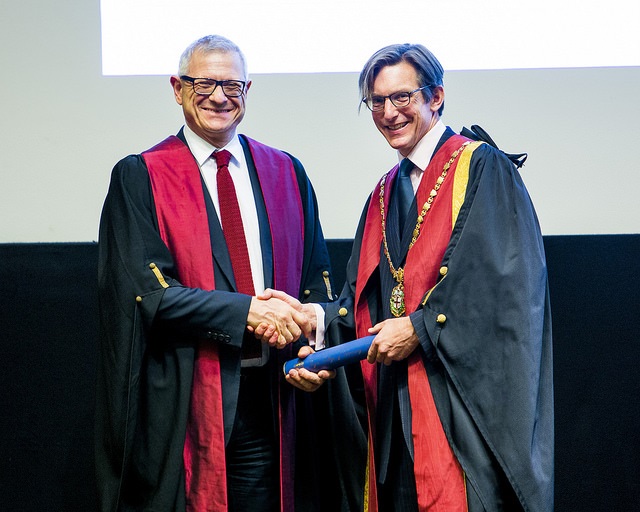 The President then thanked retiring Council members Dr Jerry Davies, Dr Chris Gray, Peter Jinman, Dr Bradley Viner and Dr Tom Witte. He paid particular attention to Jerry, Peter and Bradley (pictured right with Chris Tufnell), all of whom are past-Presidents of the College and who had served a combined total of 40 years on Council as well as on various committees and subcommittees. All three were invited to the stage by Chris to receive his thanks and their scrolls.
The President then thanked retiring Council members Dr Jerry Davies, Dr Chris Gray, Peter Jinman, Dr Bradley Viner and Dr Tom Witte. He paid particular attention to Jerry, Peter and Bradley (pictured right with Chris Tufnell), all of whom are past-Presidents of the College and who had served a combined total of 40 years on Council as well as on various committees and subcommittees. All three were invited to the stage by Chris to receive his thanks and their scrolls.
For VN Council the newly elected member Susan Howarth was formally welcomed to her four-year term by Liz Cox, Chair of VN Council.
Liz also said farewell to retiring members Marie Rippingale, Peter Robinson and Neil Smith. Liz paid particular tribute to Neil who had served on VN Council for the past nine years, including four years as Vice-Chair, and who had also chaired RCVS Awards. She pointed out that he has been a champion of the role of veterinary nurse having been instrumental in implementing VN training within the Ministry of Defence.
For the Officer team, Professor Stephen May was confirmed as President for 2017-18, Amanda Boag as Junior Vice-President, Chris Tufnell as Senior Vice-President and Christopher (Kit) Sturgess as Treasurer.
Awards and honours
Following the AGM was the awards ceremony which, in addition to established awards such as the Queen’s Medal and Golden Jubilee Award, saw the introduction of the inaugural RCVS International Award. 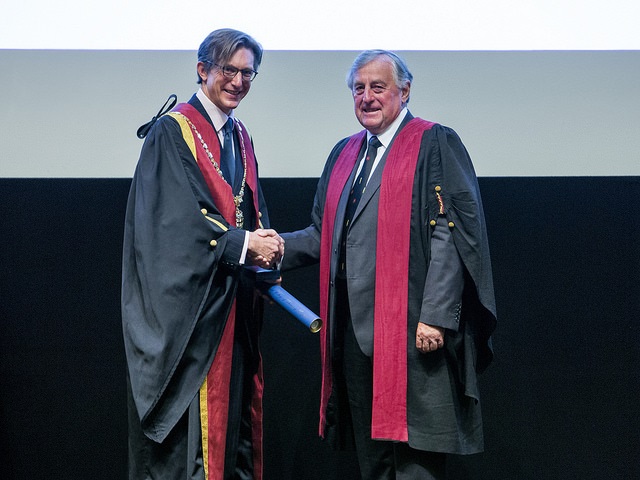 This year the Queen’s Medal – the highest honour the College can bestow upon a veterinary surgeon – was presented to Dr Barry Johnson (pictured right receiving his award) for his years of service to clinical practice, veterinary education and public service – including 28 years on RCVS Council and his position as High Sheriff of Lancashire from 2014 to 2015.
This year the Queen’s Medal – the highest honour the College can bestow upon a veterinary surgeon – was presented to Dr Barry Johnson (pictured right receiving his award) for his years of service to clinical practice, veterinary education and public service – including 28 years on RCVS Council and his position as High Sheriff of Lancashire from 2014 to 2015.
Reading the citation for Barry, Chris said: “His contributions to education, in particular, within the College were especially notable. He travelled to educational establishments all over the world to ensure that they were operating to the highest possible standards for accreditation by the RCVS.
“In addition to all his professional accomplishments, he has been a regional representative for Vetlife since 1994, supporting colleagues during some of their toughest periods. While the impact of his support, empathy and encouragement cannot be quantified, it can never be overvalued.
“From serving as the President of the Lancashire Veterinary Association in 1986, to acting as Trustee for the Animal Health Trust from 1994 to 2006, to lecturing at Myerscough College in equine and farm animal subjects for about 30 years, Barry’s contributions are truly wide-ranging.
“In 1994 Liverpool University awarded him an Honorary DVSc, and in 2005 Myerscough College made him a Fellow. We are pleased now to add to his achievements the RCVS Queen’s Medal, the highest honour we can award to a veterinary surgeon. In doing so, we hope to recognise not only his many accomplishments, but the spirit in which he conducted his career – with empathy, humour, diplomacy and integrity.”
Upon being presented with the award Barry said that, having worked with many new graduates and younger members of the profession, he was very optimistic about the profession’s future.
Following the bestowal of the Queen’s Medal, VN Council Chair Liz Cox took to the stage to present the Golden Jubilee Award – which recognises those veterinary nurses taking a leadership role in the profession. 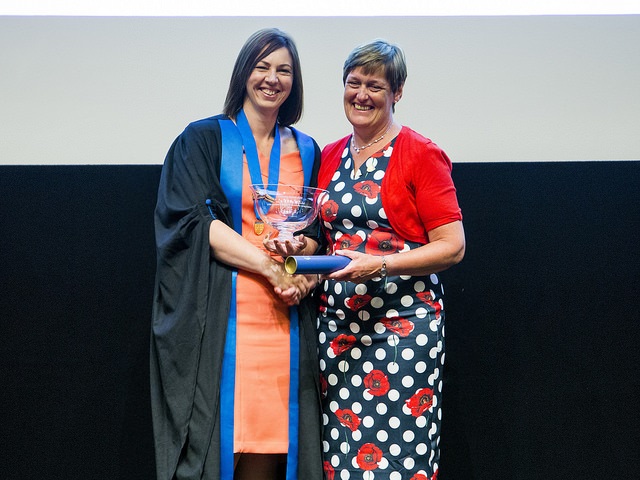 This year’s winner was Kathy Kissick (pictured with Liz), former Chair of VN Council and former Head of the School of Veterinary Nursing and Farriery at Myerscough College.
This year’s winner was Kathy Kissick (pictured with Liz), former Chair of VN Council and former Head of the School of Veterinary Nursing and Farriery at Myerscough College.
Reading Kathy’s citation, Liz said: “Kathy has been a tireless advocate of the veterinary nursing profession. Even now when in ‘phased retirement’ a typical week may involve locuming at the local veterinary clinic in Alderney, consulting remotely for veterinary nursing students at Myerscough, chairing the Animal Welfare Committee, or acting as Trustee for the Alderney Animal Welfare Society.”
She added: “Her passion for practical, evidence-based medicine has created a legacy of integrity-driven practice, and her contributions to the RCVS as VN Council Chair and VN Council member have changed the education of veterinary nurses all over the country.
“Kathy leads by example, and is a constant source of inspiration both to students and her colleagues. It is an honour to present to her today the highest honour we can bestow upon a veterinary nurse.”
Upon receiving the award Kathy told the audience that veterinary surgeons should believe in their veterinary nurses, encouraging them to pursue their dreams and wear their RVN badges with pride. 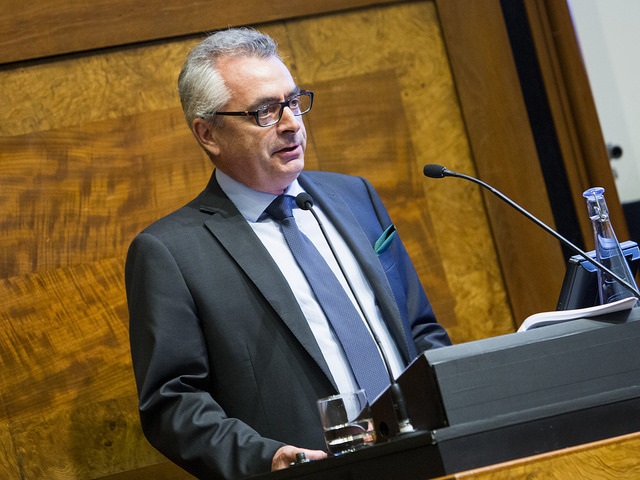 Next Chris presented the inaugural RCVS International Award to French veterinary surgeon Christophe Buhot (pictured), former President of the Federation of Veterinarians of Europe.
Next Chris presented the inaugural RCVS International Award to French veterinary surgeon Christophe Buhot (pictured), former President of the Federation of Veterinarians of Europe.
Reading from Christophe’s citation, Chris said: “Christophe is a consummate bridge-builder who is able to navigate his way around the intricacies of European politics, as demonstrated by his positive relationships with the continent’s many veterinary associations, the EU Commission, the European Parliament, the European Medicines Agency and the European Council.
“He has also reached beyond the borders of Europe by promoting dialogue and collaboration with the American Veterinary Medical Association, the Canadian Veterinary Medical Association and the World Animal Health Organisation.”
He added: “Under Christophe’s stewardship, a Vet Futures Europe project, based on what the RCVS did here in the UK in conjunction with the BVA, is underway to look at the challenges and opportunities confronting the profession across the continent as a whole.
“Christophe’s diplomacy, knowledge and ability to build strong relationships throughout Europe has helped raise the profile of veterinary practice across the continent.”
In remarks made after receiving his award, Christophe thanked the President and the RCVS for the honour and stressed the need for veterinary professionals across Europe to work even more closely with one another in politically uncertain times.
Chris then went on to bestow two Honorary Associateships – an award for lay people who have made a significant contribution in the veterinary sphere. The first was made to Heather Armstrong from the Gambia Horse & Donkey Trust for her work on health and welfare for equids. Chris spoke highly of the work carried out by the charity having volunteered for them in the past.
The second Honorary Associateship was awarded to Professor Duncan Maskell, the first non-vet Head of the Department of Veterinary Medicine at the University of Cambridge and current Senior Pro-Vice-Chancellor at Cambridge and Marks & Spencer Professor of Farm Animal Health, Food Science and Food Safety, for his contribution to pathogen research and animal-focused science.
RCVS Fellowships were also presented to Professor Andrew Cunningham, Dr Anthony Lepper (collected on his behalf by his son David Lepper) and Dr Francis Scullion, with diplomas in equine soft tissue surgery, pig medicine, small animal surgery (orthopaedics) and zoological medicine (reptilian) also being presented.
Chief Executive’s address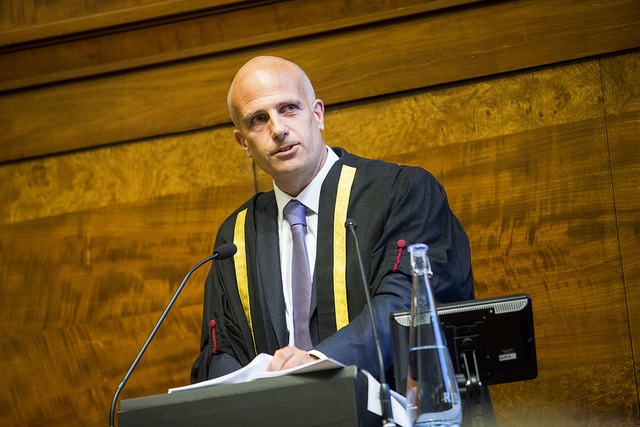 Following the awards it was time for Nick Stace (pictured), our Chief Executive Officer and Secretary, to give his final address ahead of leaving the College at the end of September to take up a role at the Prince’s Trust.
Following the awards it was time for Nick Stace (pictured), our Chief Executive Officer and Secretary, to give his final address ahead of leaving the College at the end of September to take up a role at the Prince’s Trust.
He gave an overview of his time at the College citing achievements such as the Vet and VN Futures projects and left three pieces of advice for the RCVS going forward.
“First, continue to embrace change. US Army General Eric Shinseki once observed that ‘If you don’t like change, you will like irrelevance even less’. The whole world has gone digital and if telemedicine is good enough for our children and even babies, then it is probably OK for your family cat.
“Second, be in charge of your future, the principle that inspired Vet Futures…. I am delighted to say that the profession is turning up and turning out in greater numbers than ever before. We thought 11,000 responses to the ‘Dr title’ consultation was a lot, but even more people have responded to the Schedule 3 consultation. Furthermore, 50 per cent of non-UK EU vets responded to our Brexit research and we had record turnouts in both our Council elections this year.
“Third, look after yourselves and your people. The Mind Matters Initiative has struck a chord with people because the professions, as with society at large, has real issues with mental health. We all need to work to reduce the stigma and improve the wellbeing of those around us,” he said.
Nick also praised the Council members and the Presidents he has worked with as well as the RCVS staff without whom, he said, “all these projects and initiatives over the past five years would not have happened”.
He then handed over to the outgoing President Chris Tufnell for his address.
President’s address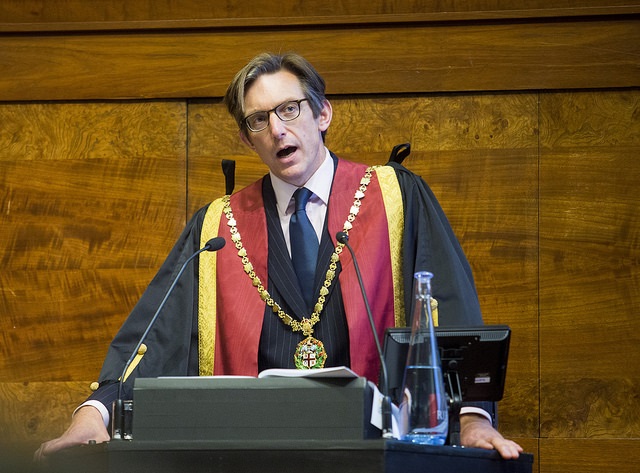 In his address, Chris (pictured) spoke about the enormous contribution veterinary surgeons and veterinary nurses make to fostering and enhancing the bond between animals and humans. He demonstrated it through a number of personal stories including his time volunteering with the Gambia Horse and Donkey Trust where he worked with local farmer N’fally and his mule Ernest and recognised that the animal was more than just a work tool but also a companion and a pet.
In his address, Chris (pictured) spoke about the enormous contribution veterinary surgeons and veterinary nurses make to fostering and enhancing the bond between animals and humans. He demonstrated it through a number of personal stories including his time volunteering with the Gambia Horse and Donkey Trust where he worked with local farmer N’fally and his mule Ernest and recognised that the animal was more than just a work tool but also a companion and a pet.
“It is in this human-animal bond that we, as vets and vet nurses, play such a vital part. When we are called upon to support this bond, we form a trinity of vet, animal and owner. It is a privileged position and one that, as individual professionals, I know we all treasure. We are ‘allowed in’ to this special relationship to ensure its continuance and I believe that it is this responsibility that drives our sense of duty from day to day,” he said.
Chris added that he was lucky enough to work on a number of projects during his presidential year and picked out Brexit and innovation as two key ones.
On Brexit he said: “It is something that we didn’t foresee when the Vet Futures project was underway, but for which so many of the Vet Futures actions will prepare us. I’m delighted that one of our responses to Brexit is to expand our global reach and strengthen the links that we have with so many other countries in the world.”
On technology he added: “As a profession, we are great innovators and so many practical solutions to problems in practice come from within the team. However, the pace of change with regards to technology is outstanding.
“I started out the year concerned that some of this change would sideline the professions and potentially be detrimental to the service we deliver. I was very wrong.
“The technologies that I have seen will enhance animal health and welfare and improve our ability to deliver it. But, it is not technology that is innovative on its own. Advances in technology enable innovative business models, and it is these that we as professionals need to seize if we are to remain in the centre of animal health and welfare.”
Once Chris had finished his address the event then moved to the investiture of Professor Stephen May as President.
Guest speaker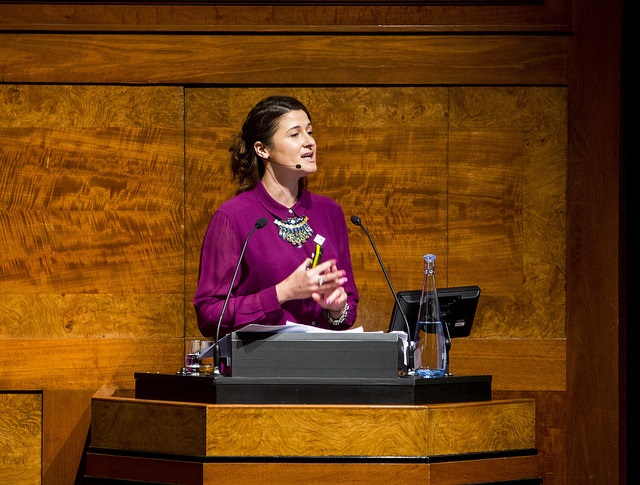 This year’s guest speaker was Ebony Escalona (pictured) from Brooke: Action for Working Horses and Donkeys, an international welfare charity that works to improve the lives of working horses, donkeys and mules and the people who depend on them.
This year’s guest speaker was Ebony Escalona (pictured) from Brooke: Action for Working Horses and Donkeys, an international welfare charity that works to improve the lives of working horses, donkeys and mules and the people who depend on them.
Her talk, entitled ‘Jump outside the veterinary box: widening our horizon’, considered a number of issues including how veterinary surgeons and veterinary nurses can contribute to One Health, combating career disillusionment through career diversification and innovation.
She described how, through her work with the Brooke, she uses her veterinary and animal welfare knowledge to educate communities in places such as Afghanistan, India, Pakistan and Senegal so that they reap the benefits of having working animals that are fit, healthy and well looked after.
She also cited the vital role of technology in disseminating information to communities, mentioning the Brooke’s new Learn Appeal, in which animal welfare education content is preloaded onto a ‘computer capsule’ that can be used in areas where the internet and access to electricity are limited or non-existent.
On the subject of career disillusionment, Ebony said that the power and reach of social media could be a tool to help spread inspiration and advice to members of the profession.
“After attending a recent session on disillusionment issues with our profession I was struck with how bad the situation was. I realised how far away I had moved from any of those feelings. Sure, I had a number of friends that felt stuck but they had all been pretty good at seeing opportunities and taking action.
“One night I had just got off the phone to a particularly lost friend. This made me really quite sad and I thought there has to be a way to facilitate inspiration for change. My story is not going to resonate with everyone but there will be people who can inspire or assist the plethora of people out there wanting to improve their professional situation. As a collective we all have incredible capabilities, backgrounds and experiences – so how can people get access to inspiration?,” she said.
She cited her Facebook group called ‘Vets: Stay, Go, Diversify’ aimed at giving positive examples of veterinary surgeons who either stayed in clinical practice, left clinical practice to pursue new avenues or diversified their portfolio.
She concluded: “Let’s focus on opportunities, not the problems. Just like Learn Appeal this [Facebook] forum is making lightbulbs accessible. In fact, everything I have been talking about regarding the Brooke and one welfare apply here. Shining light on role models, providing peer-to-peer inspiration, creating an empowering community and signposting that answers are commonly right next door.”